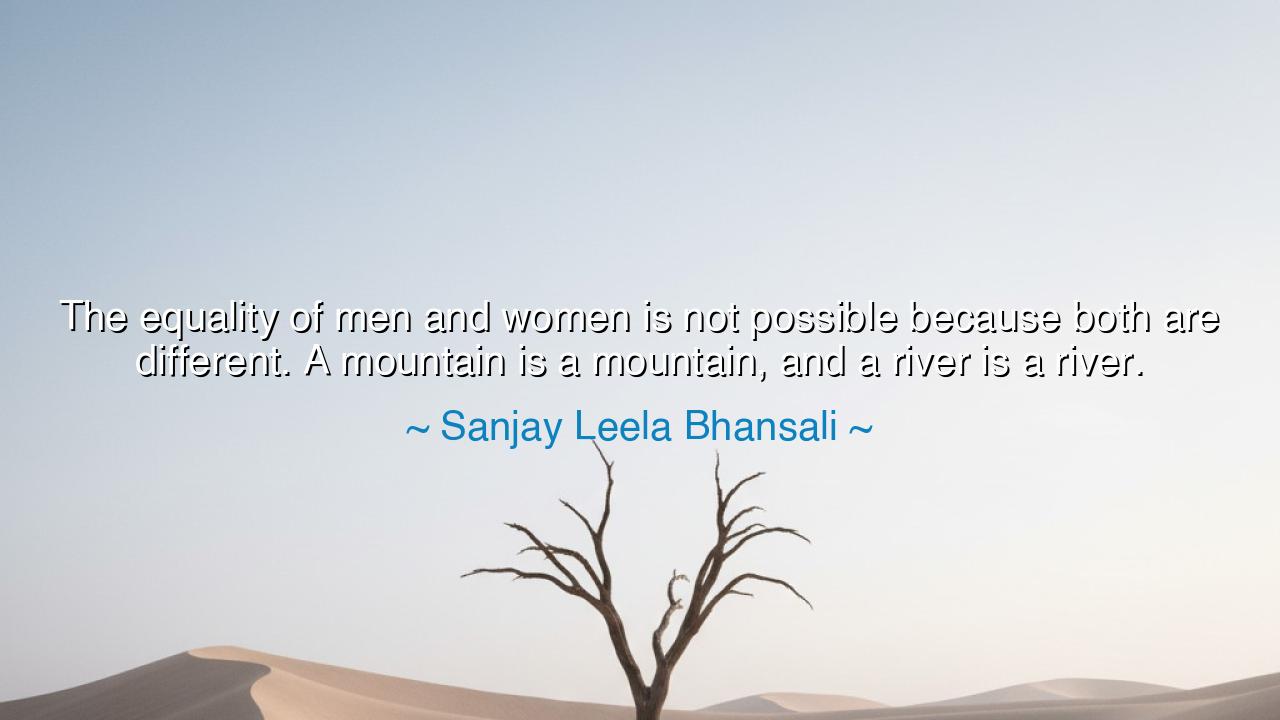
The equality of men and women is not possible because both are
The equality of men and women is not possible because both are different. A mountain is a mountain, and a river is a river.






Hear now, O children of wisdom, for the words spoken by Sanjay Leela Bhansali carry within them a deep reflection on the nature of difference, equality, and the roles that both men and women play in the grand design of life. "The equality of men and women is not possible because both are different. A mountain is a mountain, and a river is a river." These words echo with the wisdom of the ancients, for they remind us that there is profound truth in the recognition of difference—a truth that does not seek to diminish one in favor of the other, but rather to celebrate what makes each unique, powerful, and necessary in the great balance of the world.
In the earliest days of the world, when the gods created the heavens and the earth, they did not make all things the same. The mountains were placed high, where they could touch the skies, while the rivers were placed low, to nourish the land. Each had its own role to play, and yet neither was greater than the other. The mountain and the river existed not in opposition, but in harmony, complementing each other, as the forces of nature complement one another. In the same way, the equality between men and women does not mean that they must be the same; rather, it means that they must be respected for what they uniquely bring to the world.
Difference is not the enemy of equality; it is the very essence of balance. Men and women are like the mountain and the river—distinct, yes, but both essential for the health and prosperity of the earth. The mountain stands strong and immovable, a force of resilience and endurance, while the river flows with grace, carving paths through the land, gentle yet persistent. It is in the recognition of these differences that true equality lies, for each must be allowed to fulfill its purpose without being forced to become something it is not.
Think, children, of the ancient goddesses and gods, who embodied the very forces of nature. Athena, the goddess of wisdom, was born from the head of Zeus, a being of immense power and intellect. She was not a man, yet her wisdom was unmatched, her strength undeniable. She did not seek to become like Zeus, but embraced her own feminine strength, which was different from his, but equally powerful. In her, we see that equality is not the same as similarity—it is the recognition of the unique strengths and roles of each being, whether male or female.
Sanjay Leela Bhansali calls us to understand this truth: that the equality of men and women is not about erasing their differences, but rather about celebrating them. The mountain and the river each contribute to the world in their own way. The mountain provides a foundation, stability, and a sense of permanence. The river brings nourishment, fluidity, and life. One does not overshadow the other; together, they create a world that is rich with diversity and purpose. It is in the same way that men and women—with their unique strengths, roles, and abilities—are meant to complement each other, working in harmony to create a world that thrives.
There is a story from the ancient world, of the great Hercules, the son of Zeus, who was tasked with performing the Twelve Labors. In one of these labors, Hercules was called to clean the Augean stables, a task that seemed impossible, as the stables had not been cleaned for years. Yet Hercules, with his great strength, cleared the stables in a single day, using his power and determination. But Hercules was not the only hero in Greek mythology. There was Atalanta, the fierce huntress, who was swift and skilled in ways that even Hercules could not match. She had a unique strength that was different from his, yet equally vital to the balance of their world. Atalanta did not seek to be like Hercules, nor did he try to become like her. Instead, they each embraced their differences and contributed in their own way to the greater good of their world. In their differences, they found strength, not competition.
The lesson here, children, is profound: equality does not require sameness. It does not demand that men become like women, or women like men. It calls for the recognition of the unique strengths and roles that each brings to the world, and the celebration of those differences. Just as the mountain and the river each have their place, so too do men and women. The world is made rich and full not by the absence of difference, but by the harmonious coexistence of those differences.
So, children, I ask you: when you look upon the world, see not only the differences between men and women but the strength of those differences. Celebrate the mountain for its stability, and the river for its nourishment. In your own lives, seek to understand the roles that you and others play, not as a comparison, but as a complement. For in the great tapestry of life, each thread—whether of strength or gentleness, endurance or grace—plays an essential part in creating a world of balance, beauty, and unity.






AAdministratorAdministrator
Welcome, honored guests. Please leave a comment, we will respond soon